The global enterprise web development outsourcing services market is valued at USD 1.4 billion in 2025 and projected to reach USD 2.6 billion by 2035 at a CAGR of 6.5%, supported by the expansion of front-end, back-end, and integration projects across regulated industries. Front-end development leads by type, with a 34.0% share, while large enterprises account for about 57.0% of spending, driven by complex multi-region platforms and continuous deployment requirements. Between 2025 and 2030, revenue rises from USD 1.4 billion to USD 1.9 billion, and annual outsourced development hours expand from USD 1.4 million to USD 1.9 million, largely from BFSI, retail, manufacturing, and telecom, which together contribute 55–60% of outlays, under SLAs above 99%.
From 2030 to 2035, revenue climbs from USD 1.9 billion to USD 2.6 billion and workloads reach 2.5–2.6 million hours, helped by AI-assisted development and automated QA, delivering 15–18% efficiency gains and favoring vendors with 500+ enterprise-focused engineers. China leads country growth at a CAGR of 8.8%, followed by India at 8.1%, Germany at 7.5%, Brazil at 6.8%, USA at 6.2%, UK at 5.5%, and Japan at 4.9%, across East Asia, Europe, North America, South Asia, Latin America, and Middle East & Africa, with China, India, Germany, Brazil, USA, UK, Japan and 40+ additional countries covered. Competition involves providers such as Suffescom Solutions, Devox Software, Radixweb, ScienceSoft, Classic Informatics, Intellectsoft, Digital Silk, and others with strong SLA, security, and framework capabilities.
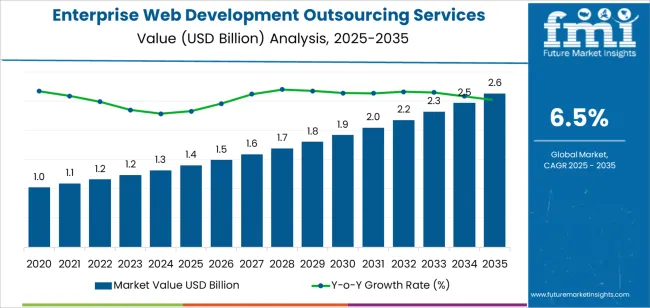
Between 2025 and 2030, the Enterprise Web Development Outsourcing Services Market expands from USD 1.4 billion to USD 1.9 billion, positioning the sector firmly in the late growth stage of the maturity curve. Enterprise outsourcing volume grows steadily as large organizations accelerate multi-platform modernization, API unification, and migration of legacy systems into cloud-native architectures. Annual outsourced development hours rise from an estimated 1.4 million to 1.9 million hours, driven by rising demand for microservices engineering, performance optimization, and enterprise-grade security integrations. Adoption is strongest in BFSI, retail, manufacturing, and telecom, which collectively account for 55–60 % of all enterprise web outsourcing spend. Vendor selection increasingly depends on SLA adherence above 99 %, proven domain expertise, full-stack capability coverage, and adherence to strict governance frameworks such as SOC 2 and ISO/IEC 27001.
From 2030 to 2035, the market rises from USD 1.9 billion to USD 2.6 billion, transitioning into the early maturity stage of the adoption lifecycle. Growth becomes more replacement and optimization driven as enterprises shift from initial transformation projects to continuous lifecycle management, long-horizon platform scaling, and full DevOps integration. Annual outsourced workload increases toward 2.5–2.6 million hours, supported by project types such as zero-downtime re-architecture, multi-cloud orchestration, and advanced DXP (Digital Experience Platform) deployment. AI-assisted development and automated QA contribute 15–18 % efficiency gains, restructuring project timelines and cost models. Large outsourcing firms with 500+ enterprise-specialized engineers gain competitive advantage as clients consolidate vendor portfolios. Emerging regions, notably South Asia, Eastern Europe, and Latin America, contribute 12–14 % of new enterprise outsourcing commitments as global corporations expand distributed delivery networks for resilience and cost optimization.
| Metric | Value |
|---|---|
| Market Value (2025) | USD 1.4 billion |
| Market Forecast Value (2035) | USD 2.6 billion |
| Forecast CAGR (2025–2035) | 6.5% |
Demand for enterprise web development outsourcing is rising as organizations require scalable digital platforms but face variable internal staffing capacity. Enterprises outsource front-end development, API integration, CMS engineering, and application modernization to firms with established technical teams and domain specialization. This model supports predictable project delivery and reduces the burden of maintaining large in-house departments during uneven development cycles. Providers strengthen capabilities in cloud-native architecture, high-availability frameworks, and secure coding practices to meet enterprise-grade compliance requirements. Companies in finance, retail, healthcare, and manufacturing rely on outsourced teams to support multilingual sites, customer portals, and workflow platforms that must maintain uptime and performance under heavy traffic. These priorities reinforce enterprise adoption of external development partners.
Market growth also reflects the increasing complexity of cybersecurity, data privacy, and cross-platform performance requirements. Outsourcing firms integrate threat modeling, identity management, and containerized deployment pipelines into their development processes, enabling clients to meet regulatory standards across multiple regions. Enterprises prioritize providers offering strong documentation, code-governance policies, and transparent collaboration frameworks that support distributed development across time zones. Demand strengthens as firms pursue digital transformation programs involving system consolidation, API modernization, and microservices migration. Although vendor selection risk and intellectual property protection remain concerns, improved contractual controls, audit frameworks, and long-term support agreements enhance trust. These conditions ensure steady expansion of enterprise web development outsourcing across global technology, operations, and customer-experience initiatives.
The enterprise web development outsourcing services market is segmented by type, application, and region. By type, the market is divided into front-end development and back-end development. Based on application, it is categorized into large enterprises and small and medium-sized enterprises. Regionally, the market is segmented into North America, Europe, East Asia, South Asia, Latin America, and the Middle East & Africa. These divisions reflect technical specialization, organizational workload patterns, and regional outsourcing preferences linked to enterprise-scale digital operations.
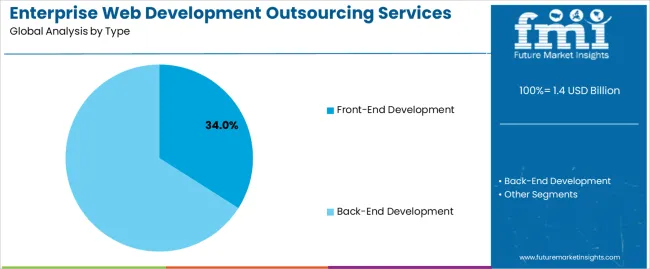
The front-end development segment accounts for approximately 34.0% of the enterprise web development outsourcing services market in 2025, making it the leading type category. This position is supported by continuous demand for user-interface updates across enterprise platforms that rely on frequent design changes and compatibility adjustments. Enterprises outsource front-end tasks to secure predictable rendering across devices, accessibility compliance, and interface consistency during high-volume product iteration cycles. The segment covers activities such as layout refinement, component implementation, performance optimization, and cross-browser testing that require significant labor and structured testing routines.
Providers enhance workflow efficiency through established frameworks, reusable component libraries, and version-control practices that suit enterprise development pipelines. Adoption is strong in North America, Europe, and East Asia, where large organizations maintain extensive customer portals, internal dashboards, and service platforms that undergo routine visual and functional updates. Outsourced teams supply scalable capacity to support release schedules tied to marketing, regulatory changes, and digital transformation programs. The front-end segment keeps its leading role because enterprise platforms require ongoing interface refinement, predictable visual behavior, and sustained adaptability to evolving design standards and device environments.
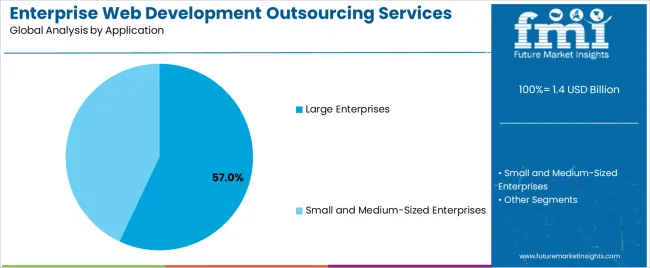
The large enterprises segment represents about 57.0% of the total enterprise web development outsourcing services market in 2025, making it the dominant application category. This leadership reflects the scale and complexity of enterprise digital infrastructures, which include multi-region platforms, customer-service systems, transactional portals, and integrated internal applications. Large enterprises rely on outsourcing partners to expand development capacity, manage workload fluctuations, and meet delivery targets for broad feature sets. They require structured development workflows, extensive code management, and testing practices aligned with corporate security and data-handling standards.
Outsourcing providers supply specialized teams experienced in enterprise frameworks, API management, authentication systems, and multi-layer architecture integration. Growth in this segment is supported by digital modernization programs in North America and Europe and by expanding enterprise software footprints in East Asia. Large enterprises often operate with parallel development tracks, making external staffing essential for meeting deadlines and maintaining continuous deployment cycles. The segment retains its leading position because these organizations have sustained demand for coordinated development support that offers technical depth, predictable throughput, and scalable resource allocation across complex web systems.
The enterprise web development outsourcing services market is expanding as organizations seek scalable technical capacity to support complex digital platforms. Enterprises outsource to reduce development costs, accelerate delivery and access specialized skills that are difficult to maintain in-house. Growth is supported by wider digital transformation programs, legacy-system modernization and rising demand for secure, API-driven applications. Adoption is limited by data-security concerns, coordination challenges and variability in vendor performance.
Demand rises as enterprises pursue modernization of customer portals, internal platforms and ecommerce ecosystems. Many firms require specialized skills in cloud-native development, microservices and modern frontend frameworks that cannot be scaled quickly through internal hiring. Outsourcing enables multi-team development, faster release cycles and access to global engineering talent. Enterprises also rely on outsourcing partners to handle peak workloads, re-platform legacy systems and support long-term maintenance. As digital operations expand across industries, reliance on structured outsourcing partnerships increases.
Adoption is hindered by data-security risks, compliance requirements and the need for strong intellectual-property protection. Communication gaps, inconsistent delivery quality and differences in tooling or coding standards can cause delays. Enterprises often face higher coordination costs when integrating distributed teams into existing workflows. Some firms prefer internal development to maintain direct control over architecture and codebases. Budget constraints and concerns about long-term vendor dependency also slow adoption, particularly in regulated industries or organizations transitioning from legacy processes.
Key trends include adoption of agile and DevOps workflows, expansion of full-stack capabilities and deeper specialization in cloud, cybersecurity and enterprise integration. Providers are strengthening domain expertise in fintech, healthcare, ecommerce and supply-chain systems. Nearshore and hybrid outsourcing models are gaining traction to improve communication and alignment. Automation tools enhance testing, CI/CD pipelines and quality control. Enterprises increasingly seek multi-year partnerships with providers that can deliver strategy, development and maintenance under unified frameworks. As digital ecosystems evolve, outsourcing firms differentiate through technical depth, predictable delivery and robust security practices.
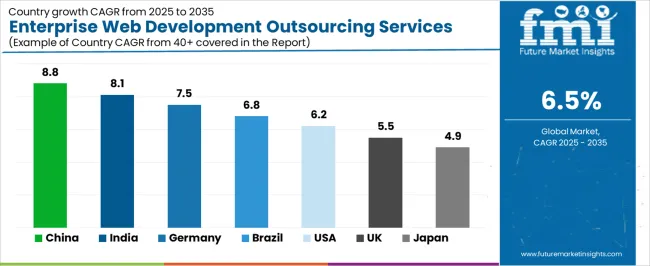
| Country | CAGR (%) |
|---|---|
| China | 8.8% |
| India | 8.1% |
| Germany | 7.5% |
| Brazil | 6.8% |
| USA | 6.2% |
| UK | 5.5% |
| Japan | 4.9% |
The Enterprise Web Development Outsourcing Services Market continues to expand steadily worldwide, with China leading at an 8.8% CAGR through 2035, driven by large-scale digital transformation, cost-efficient development ecosystems, and the rapid rise of enterprise cloud and e-commerce platforms. India follows at 8.1%, supported by its globally dominant IT outsourcing sector, abundant engineering talent, and strong demand for enterprise-grade full-stack development and modernization projects. Germany records 7.5%, reflecting growing nearshoring needs, high standards in secure enterprise software, and strong adoption of cloud-native architectures. Brazil grows at 6.8%, fueled by accelerating digitalization across financial, retail, and industrial enterprises. The USA, at 6.2%, remains a mature market emphasizing specialized, high-value outsourcing, while the UK (5.5%) and Japan (4.9%) continue focusing on secure, scalable, and innovation-driven outsourced development to enhance enterprise IT agility.
China is projected to grow at a CAGR of 8.8% through 2035 in the enterprise web development outsourcing services market. Increasing deployment of corporate portals, digital workflow tools, and cross-department platforms expands outsourcing needs. Providers deliver frontend modules, system architecture refinement, and scalable integration tasks. Regional firms adopt coordinated project pipelines to support large engagements. Cross-sector digital transformation increases demand for external engineering capacity. Enterprises request teams capable of maintaining stable development cycles. Market progression aligns with rising adoption of online management tools across manufacturing, logistics, retail, and administrative operations.
India is expected to expand at a CAGR of 8.1% through 2035 in the enterprise web development outsourcing services market. Adoption of cloud systems, customer portals, and workflow automation tools fuels outsourcing requirements. Providers offer structured coding support, interface upgrades, and multi-module integration. Remote engineering hubs serve clients managing extended release cycles. Domestic enterprises adopt standardized development patterns improving coordination. Growth in e-governance and enterprise service platforms increases outsourcing volume. Market expansion aligns with ongoing digital transformation across financial institutions, logistics operators, large retailers, and corporate service providers nationwide.
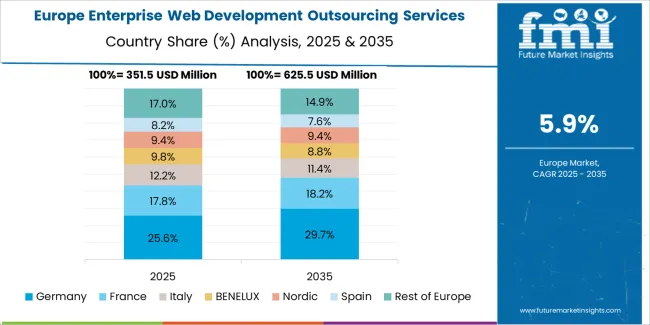
Germany is projected to grow at a CAGR of 7.5% through 2035 in the enterprise web development outsourcing services market. Strong emphasis on structured engineering, compliance frameworks, and platform modernization drives outsourcing adoption. Providers supply reliable coding support, extensive testing processes, and secure integration workflows. Manufacturing and automotive firms upgrade internal systems requiring persistent engineering resources. Legacy system migration generates recurring outsourced development tasks. Market progress aligns with broader digital transformation across regulated technical sectors and multi-site industrial operations demanding consistent engineering output.
Brazil is forecast to rise at a CAGR of 6.8% through 2035 in the enterprise web development outsourcing services market. Adoption of digital service portals, online retail systems, and logistics platforms increases outsourcing activity. Providers offer modular development, backend upgrades, and performance optimization. Regional enterprises outsource workloads to accelerate deployment timelines. Remote development centers support companies servicing multiple states. Growth in corporate cloud use reinforces demand for scalable engineering support. Market activity aligns with expanding digital operations across retail, financial services, and transportation networks requiring continuous platform enhancement.
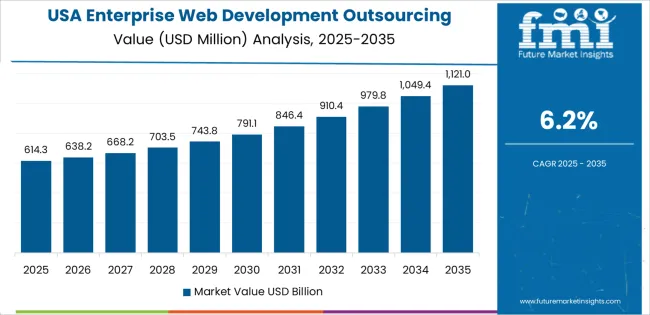
USA is projected to grow at a CAGR of 6.2% through 2035 in the enterprise web development outsourcing services market. Corporate demand for platform consolidation, cloud-native tools, and modern interface designs supports outsourcing growth. Providers deliver component-based development, code refactoring, and multi-environment testing. Enterprises adopt distributed engineering models supporting national coordination. Upgrades of customer-facing platforms increase outsourcing volume across industries. Market activity aligns with ongoing modernization in healthcare, retail, logistics, and financial organizations requiring scalable engineering support for large development pipelines.
UK markets are projected to grow at a CAGR of 5.5% through 2035 in the enterprise web development outsourcing services market. Increased reliance on workflow platforms, internal corporate portals, and digital service systems elevates outsourcing usage. Providers supply modular coding, accessibility updates, and cross-platform adjustments. Enterprises modernize legacy applications while maintaining strict delivery schedules. Remote engineering teams assist companies with long-term update cycles. Market expansion aligns with the nationwide shift toward structured digital service delivery in public agencies, retail operations, and corporate service groups.
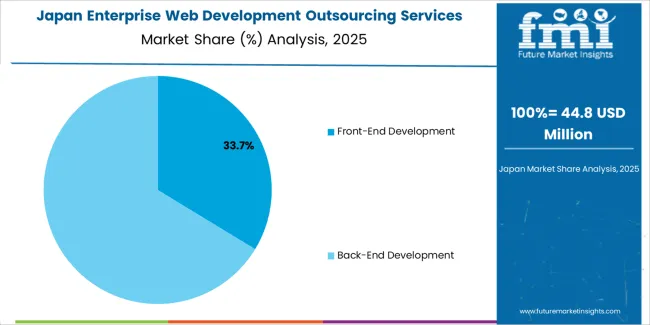
Japan is projected to expand at a CAGR of 4.9% through 2035 in the enterprise web development outsourcing services market. Rising development of workflow software, customer platforms, and data-centric tools expands outsourcing needs. Providers deliver structured coding support, modular interface design, and standardized integration tasks. Domestic firms request external teams to manage peak workloads. Enterprises adopt organized release plans supported by outsourced resources. Market growth aligns with broader digital process adoption across manufacturing, logistics, corporate administration, and service industries requiring consistent engineering capability.
The global enterprise web development outsourcing services market is highly fragmented, shaped by firms delivering large-scale engineering, modernization, and integration support for corporate platforms. Suffescom Solutions and Devox Software hold strong positions with full-cycle development teams that manage complex enterprise workflows and long-horizon projects. Radixweb and ScienceSoft maintain significant presence through established engineering practices suited for financial services, healthcare, and manufacturing clients. Classic Informatics and Intellectsoft contribute multi-technology expertise that supports legacy modernization and cloud-native transitions. Digital Silk, Dotsquares, Infinum, and Bilberrry reinforce upper-tier competition by combining enterprise UX design with robust engineering structures. Saigon Technology, DICEUS, and 365 Outsource expand access to cost-efficient offshore teams capable of scaling long-running enterprise programs.
Rollout IT, GetDevDone, InternetDevels, and Aimprosoft strengthen mid-tier offerings through framework-specific development, CMS builds, and nearshore delivery models. NarraSoft, IT Craft, and Tigren broaden market availability with full-stack support suited for global enterprise clients requiring predictable delivery schedules and post-launch maintenance. Competition is shaped by engineering depth, security compliance, and the ability to integrate with corporate infrastructure. Strategic differentiation depends on transparent communication models, domain-specific expertise, and long-term maintenance capabilities. As enterprises accelerate digital modernization, providers offering secure architectures, cloud proficiency, and stable team structures are positioned to strengthen their role in global outsourcing portfolios.
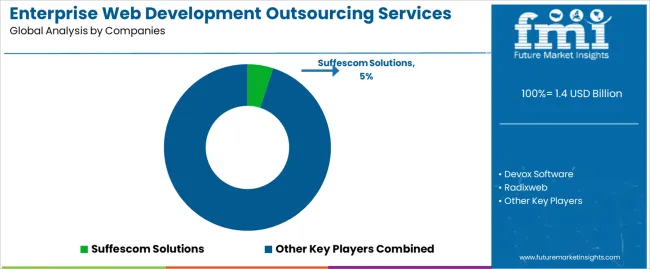
| Items | Values |
|---|---|
| Quantitative Units (2025) | USD billion |
| Type | Front-End Development, Back-End Development |
| Application | Large Enterprises, Small and Medium-Sized Enterprises |
| Regions Covered | East Asia, Europe, North America, South Asia, Latin America, Middle East & Africa |
| Countries Covered | China, India, Germany, Brazil, USA, UK, Japan, and 40+ additional countries |
| Key Companies Profiled | Suffescom Solutions, Devox Software, Radixweb, ScienceSoft, Classic Informatics, Intellectsoft, Digital Silk, Dotsquares, Infinum, Bilberrry, Saigon Technology, DICEUS, 365 Outsource, Rollout IT, GetDevDone, InternetDevels, Aimprosoft, NarraSoft, IT Craft, Tigren |
| Additional Attributes | Dollar sales by type and application categories, regional adoption trends across North America, Europe, and East Asia, competitive landscape among enterprise web development providers, technology stacks and framework demand (React, Angular, Node.js), SLA and security/compliance requirements, nearshore/offshore delivery and hybrid delivery models |
The global enterprise web development outsourcing services market is estimated to be valued at USD 1.4 billion in 2025.
The market size for the enterprise web development outsourcing services market is projected to reach USD 2.6 billion by 2035.
The enterprise web development outsourcing services market is expected to grow at a 6.5% CAGR between 2025 and 2035.
The key product types in enterprise web development outsourcing services market are front-end development and back-end development.
In terms of application, large enterprises segment to command 57.0% share in the enterprise web development outsourcing services market in 2025.






Our Research Products

The "Full Research Suite" delivers actionable market intel, deep dives on markets or technologies, so clients act faster, cut risk, and unlock growth.

The Leaderboard benchmarks and ranks top vendors, classifying them as Established Leaders, Leading Challengers, or Disruptors & Challengers.

Locates where complements amplify value and substitutes erode it, forecasting net impact by horizon

We deliver granular, decision-grade intel: market sizing, 5-year forecasts, pricing, adoption, usage, revenue, and operational KPIs—plus competitor tracking, regulation, and value chains—across 60 countries broadly.

Spot the shifts before they hit your P&L. We track inflection points, adoption curves, pricing moves, and ecosystem plays to show where demand is heading, why it is changing, and what to do next across high-growth markets and disruptive tech

Real-time reads of user behavior. We track shifting priorities, perceptions of today’s and next-gen services, and provider experience, then pace how fast tech moves from trial to adoption, blending buyer, consumer, and channel inputs with social signals (#WhySwitch, #UX).

Partner with our analyst team to build a custom report designed around your business priorities. From analysing market trends to assessing competitors or crafting bespoke datasets, we tailor insights to your needs.
Supplier Intelligence
Discovery & Profiling
Capacity & Footprint
Performance & Risk
Compliance & Governance
Commercial Readiness
Who Supplies Whom
Scorecards & Shortlists
Playbooks & Docs
Category Intelligence
Definition & Scope
Demand & Use Cases
Cost Drivers
Market Structure
Supply Chain Map
Trade & Policy
Operating Norms
Deliverables
Buyer Intelligence
Account Basics
Spend & Scope
Procurement Model
Vendor Requirements
Terms & Policies
Entry Strategy
Pain Points & Triggers
Outputs
Pricing Analysis
Benchmarks
Trends
Should-Cost
Indexation
Landed Cost
Commercial Terms
Deliverables
Brand Analysis
Positioning & Value Prop
Share & Presence
Customer Evidence
Go-to-Market
Digital & Reputation
Compliance & Trust
KPIs & Gaps
Outputs
Full Research Suite comprises of:
Market outlook & trends analysis
Interviews & case studies
Strategic recommendations
Vendor profiles & capabilities analysis
5-year forecasts
8 regions and 60+ country-level data splits
Market segment data splits
12 months of continuous data updates
DELIVERED AS:
PDF EXCEL ONLINE
Enterprise Asset Management Market Size and Share Forecast Outlook 2025 to 2035
Enterprise A2P SMS Market Size and Share Forecast Outlook 2025 to 2035
Enterprise-Class Hybrid Storage Market Size and Share Forecast Outlook 2025 to 2035
Enterprise Feedback Management Market Size and Share Forecast Outlook 2025 to 2035
Enterprise Social Graph Market Size and Share Forecast Outlook 2025 to 2035
Enterprise File Sync And Share Platform Market Size and Share Forecast Outlook 2025 to 2035
Enterprise Mobility Market Size and Share Forecast Outlook 2025 to 2035
Enterprise Metadata Management Market Size and Share Forecast Outlook 2025 to 2035
Enterprise Rights Management Solution Market Size and Share Forecast Outlook 2025 to 2035
Enterprise LLM Market Size and Share Forecast Outlook 2025 to 2035
Enterprise VSAT Systems Market Size and Share Forecast Outlook 2025 to 2035
Enterprise AI Governance and Compliance Market Analysis - Size, Share, and Forecast Outlook 2025 to 2035
Enterprise Feedback Management Industry Analysis in Western Europe Size and Share Forecast Outlook 2025 to 2035
Enterprise Feedback Management Industry Analysis in Korea Size and Share Forecast Outlook 2025 to 2035
Enterprise Feedback Management Industry Analysis in Japan Size and Share Forecast Outlook 2025 to 2035
Enterprise Resource Planning (ERP) Software Market Size and Share Forecast Outlook 2025 to 2035
Enterprise Content Management Market Size and Share Forecast Outlook 2025 to 2035
Enterprise IoT Market Size and Share Forecast Outlook 2025 to 2035
Enterprise Data Management Market Size and Share Forecast Outlook 2025 to 2035
Enterprise WLAN Market Size and Share Forecast Outlook 2025 to 2035

Thank you!
You will receive an email from our Business Development Manager. Please be sure to check your SPAM/JUNK folder too.
Chat With
MaRIA